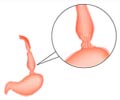A study conducted by the researchers from the Yale School of Medicine has revealed that diet soda drinkers run a decreased risk of contracting cancer. Until recently it was believed that there was a 350% higher risk of getting esophageal cancer through consuming carbonated soft drinks. In their study published in the recent of Journal of the National Cancer Institute (JNCI), the researchers report that the link is unfounded, and warn diet soft drink consumers might differ from other groups, because they may engage in other unmeasured healthy behaviors.
It was hypothesized by others that carbonated soft drinks might have contributed to the development of adenocarcinoma of the esophagus. The theory was based on factors including similar time trends; acidic carbonated soft drinks causing gastric distension that might affect the lower esophagus; and association of carbonated soft drinks with heartburn at night."The theory that soft drinks could be causing this cancer was picked up by the media and widely disseminated. However, there was no direct evidence to bear on this hypothesis, until we initiated our analysis," said lead author Susan Mayne.
Potential causes of esophageal adenocarcinoma were identified by Mayne and her colleagues in a previously completed population-based, multi-center study of 1,095 cancer patients and 687 control subjects. As part of that study, they conducted a full dietary interview and had access to available data on consumption of both regular and diet soft drinks.
"Our team analyzed that data as the first direct test of the hypothesis that soft drinks might have contributed to the increase in this cancer. We found that contrary to the hypothesis put forth by other researchers, carbonated soft drink consumption was inversely associated with esophageal adenocarcinoma risk, mainly attributable to diet soda, and that high intake did not increase risk of any esophageal or gastric cancer subtype in men or women," said Mayne.
Edited (ANI)











